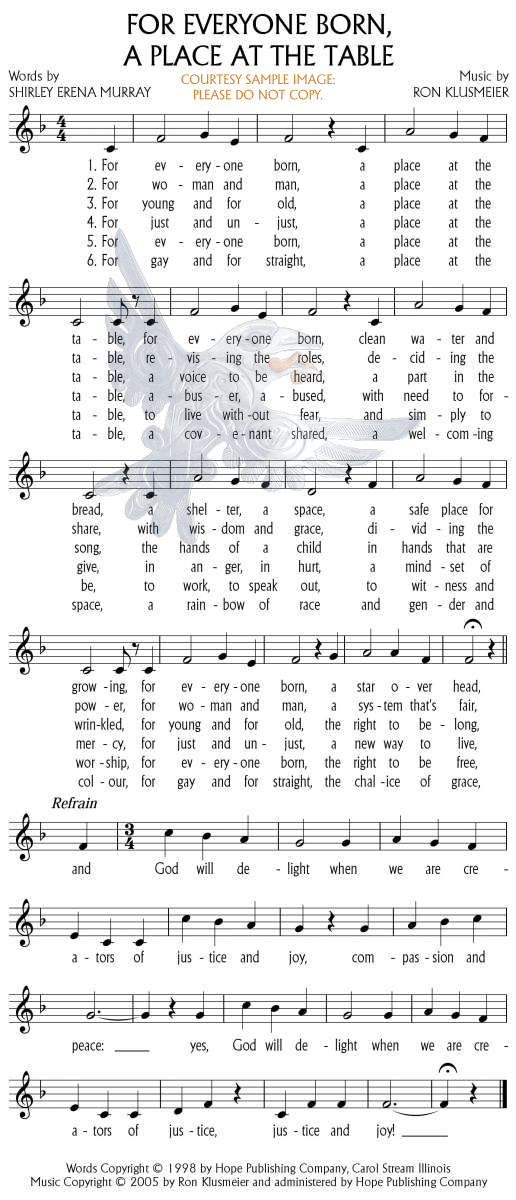For Everyone Born, a Place at the Table
Music by Ron KlusmeierWords by Shirley Erena Murray
Tune Name: RAE

Lyrics as Poetry
For everyone born, a place at the table,
for everyone born, clean water and bread,
a shelter, a space, a safe place for growing,
for everyone born, a star overhead,
and God will delight when we are creators
of justice and joy, compassion and peace:
yes, God will delight when we are creators
of justice, justice and joy!
•
For woman and man, a place at the table,
revising the roles, deciding the share,
with wisdom and grace, dividing the power,
for woman and man, a system that’s fair,
and God will delight when we are creators
of justice and joy, compassion and peace:
yes, God will delight when we are creators
of justice, justice and joy!
•
For young and for old, a place at the table,
a voice to be heard, a part in the song,
the hands of a child in hands that are wrinkled,
for young and for old, the right to belong,
and God will delight when we are creators
of justice and joy, compassion and peace:
yes, God will delight when we are creators
of justice, justice and joy!
•
For just and unjust, a place at the table,
abuser, abused, with need to forgive,
in anger, in hurt, a mindset of mercy,
for just and unjust, a new way to live,
and God will delight when we are creators
of justice and joy, compassion and peace:
yes, God will delight when we are creators
of justice, justice and joy!
•
For everyone born, a place at the table,
to live without fear, and simply to be,
to work, to speak out, to witness and worship,
for everyone born, the right to be free,
and God will delight when we are creators
of justice and joy, compassion and peace:
yes, God will delight when we are creators
of justice, justice and joy!
•
For gay and for straight, a place at the table,
a covenant shared, a welcoming space,
a rainbow of race and gender and colour,
for gay and for straight, the chalice of grace,
and God will delight when we are creators
of justice and joy, compassion and peace:
yes, God will delight when we are creators
of justice, justice and joy!
Words by
Shirley Erena MurrayCopyright © 1998 by Hope Publishing Company
Carol Stream, Illinois • USA
Audio Sample for
"For Everyone Born,
a Place at the Table"
One verse and refrain
played on piano
Scripture References
- 2 Samuel 9:7
- Isaiah 6:8
- Isaiah 10:11
- Isaiah 65:17-25
- Ezekiel 34:11-31
- Micah 6:8
- Matthew 25:31-40
- Luke 4:14-21
- Luke 5:27-32
- Luke 9:10-20
- Luke 13:29
- Luke 14:15-24
- John 6:1-14
- Acts 2:17-18
- Acts 9:1-20
- Revelation 21:1-2
- Revelation 22:1-2
Season, Theme
or Subject
- Acceptance
- Affirming
- Bread
- Children
- Co-creators
- Community
- Compassion
- Diversity
- Equality
- Forgiveness
- Free, Freedom
- Grace
- Justice, Human Rights
- Liberation
- Love
- Mercy
- Peace
- Pride Celebrations
- Shelter
- Table
- Unity
- Water∶ water in nature
- Welcome
- Wisdom
Presentation Suggestions
Not yet available for this title. Contact us if you are a subscriber (or purchaser of this title) and need this item.
Projection Images
This feature is only accessible to Subscribers or those who have purchased this Single Title.
Use the link below for instructions on how to use the Projection Images in Powerpoint and Keynote.
Learn moreProjection Images
Available for This Title
16:9 Words Only
16:9 Words With Music
16:9 Words With Images
4:3 Words Only
4:3 Words With Music
4:3 Words With Images
Accompaniment Recordings
Not yet available for this title. Contact us if you are a subscriber (or purchaser of this title) and need this item.
-
Subscribe To All Titles
unlimited annual access to everything on this site
-
Purchase
This Title
unlimited access to all versions of this title
-
unlimited access to an individual version of this title
Purchasers and Subscribers
Click links below to download your versions.
Versions Available for This Title
Melody Line Versions (includes transposing instruments)
-
Melody Line: 'C' Instrument or Vocal
-
Melody Line: 'C' Instrument 8va
-
Melody Line: Bass Clef 'C' Instrument
-
Melody Line: Alto Clef Instrument
-
Melody Line: ‘Bb’ Instrument
-
Melody Line: ‘Eb’ Instrument
-
Melody Line: ‘F’ Instrument (high)
-
Melody Line: ‘F’ Instrument (low)
Piano Versions
Hymn-style Vocal Harmonizations (accompany with any piano versions)
-
Hymn-style: SATB voices
Guitar Chords & Bass Progressions
-
Guitar & Bass: Full chords in keyboard key
-
Guitar: Transposed capo chords
-
Easy Guitar: Basic chords
Comments About Song
Comment by
SHIRLEY ERENA MURRAY
from her book
“Faith Makes the Song” (#11):
“‘A Place at the Table’ was evoked by the UN Declaration of Human Rights and my involvement with Amnesty International It’s a matter of choice whether the refrain is sung between stanzas 2-4 or not.”
Faith Makes the Song
is published by:Hope Publishing Company
Carol Stream, IL USA
A Reflection by hymnwriter
WALTER FARQUHARSON
There’s a tension that runs throughout the books of the bible. It is there, explicitly or implicitly in the remembered history of the Jewish people as recorded from Genesis, through entry to the promised land, the rise of kings and the building of the temple, the utterances of the prophets, in many of the psalms.
Again and again that tension plays out in the gospel stories and in the teachings and life of the early churches even to the closing verses of the Book of the Revelation to John. The evidence is clearly written in the centuries of church history. In fact it is, in a variety of forms, a tension found in histories ancient and modern. It is a tension that fills our news and commentaries, our tweets and twitters, and a surprising amount of our conversations.
Basically, it boils down to this, “Who’s in? Who’s out?” “Who belongs and who does not?”
Cain kills his brother Abel. That ancient story is not a piece of history but it is a commentary on history. Rivalries develop and are nurtured in hearts distanced from God and the intentions of God for humankind. The story includes different economic systems – settled agriculture and tilling of the ground versus the shifting world of herds and flocks. Each brother seeks ethical and religious justification that culminates in an act of fratricide.
The wonderful story of Exodus proclaims that God hears the cries of an abused and subjugated slave people freed and then awarded the Promised Land that flowed with ‘milk and honey’. Children hearing this story often ask embarrassing questions about the plagues and the death of the Egyptian children and then the destruction of the Egyptian armies followed by the takeover of Canaan. The blessed are blessed – but others …? The human story globally has relived such dramas. The poet Rudyard Kipling wrote of ‘the white man’s burden’, the unpleasant responsibilities of bringing light to the unenlightened that was mostly about building empires, exploiting peoples and resources. Such evils as slavery and various apartheids, genocides and ethnic cleansings, dropping atomic bombs on more expendable Asians, are all tragic examples of the cost of our universal failure to see the humanity of others. Too easily we create doctrines of Manifest Destiny cloaked with claims to a higher morality and a truer religion. We proclaim supremacy and truth based on race or religion or a “take your pick” reason for hating and wishing the death or disappearance of “others’.
There is tension because a different voice offers an alternative that is based on trust not fear, an alternative however improbable it may seem, of love giving rise to justice, peace, community and welcome.
The story of Jacob in Genesis is a story of awakening. His journey has taken him beyond the territory where the God he knows is in charge. To Jacob’s surprise his dreaming moves him to see that “God is in this place.” A place beyond the former boundary and definition. The Book of Jonah tells of the conflict of the prophet who does not want to go to Nineveh – a godless and dangerous un-Hebrew place. The reason he does not want to go is that he senses that God is forgiving and compassionate and does not hate the Ninevites. Prophets like Isaiah reminded the people that the temple in Jerusalem should be “a house of prayer for all nations”, not an excluding possession of the nation or the religious authorities who guarded the temple.
Jesus annoyed the authorities and scandalized many of the people because he welcomed outsiders and ate with those who the law said he should not eat. He spoke to the Samaritan woman at the well and honoured her questioning of doctrines that excluded people and that claimed to possess God and truth. He, and his disciples, lived within the tensions of a society fraught with attitudes of possession and inclusion and they struggled to grow and to be faithful. We do well to identify these struggles and see them also as our own without assuming that we are immune to these destructive forces.
The struggle continued for Peter (Acts 10) and for Paul (Acts 9:1-19). In Paul’s letter to the Galatians (3:28) he writes, “There is no longer Jew nor Greek, slave or free, male or female ; all of you are one in Christ Jesus.” These words are addressed to the church and he is speaking particularly to those baptised. The implications of this, in and beyond the church, are for our continued reflection, repentance and correction. In John’s gospel Jesus speaks to his followers assuring them that God’s love is inclusive and empowering and that their mission is to go into the world “doing the works that I have done.” James, in his letter, makes it clear that divisions based on who has and who has not, who counts and who doesn’t matter, are totally alien to the path of true discipleship.
The closing chapters of the Revelation to John speak of a new heaven and a new earth. Where the river of life flows there is blessing. The tree of life flourishes and its leaves are for the healing of the nations.
The implications of that vision for our work as followers of Jesus are powerfully set out in this song written by Shirley Erena Murray. It deserves our careful reading and our commitment and conviction in our singing. It deserves our prayerful reflection and our prayerful discussion with others. We will be blessed if whenever we gather at the table in our churches, when we celebrate communion, we bring this understanding with us. So too when we gather for a meal shared with family and friends, indoors or out, fancy or plain, we carry a piece of this proclamation with us… then who knows what, by God’s grace, might unfold.
An Activity: On your own, or in a group, choose one of the verses of this song. Read it aloud. Reflect quietly for a short while. List, or discuss, your thoughts, places of tension, of sadness, of joy, of applying some of it in your daily living.